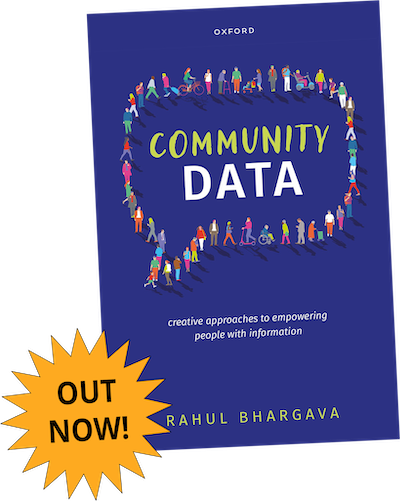We’ll be presenting our collaborative work on the Data Against Feminicide project at the 2022 ACM Conference on Fairness, Accountability and Transparency. We’re very excited to put forward this work as a case study in intersectional feminist and participatory approaches to machine learning.
Towards Intersectional Feminist and Participatory ML: A Case Study in Supporting Feminicide Counterdata Collection
Harini Suresh, Rajiv Movva, Amelia Lee Dogan, Rahul Bhargava, Isadora Cruxên, Ángeles Martinez Cuba, Giulia Taurino, Wonyoung So, Catherine D’Ignazio
Paper Abstract
Data ethics and fairness have emerged as important areas of re- search in recent years. However, much work in this area focuses on retroactively auditing and “mitigating bias” in existing, poten- tially flawed systems, without interrogating the deeper structural inequalities underlying them. There are not yet examples of how to apply feminist and participatory methodologies from the start, to conceptualize and design machine learning-based tools that center and aim to challenge power inequalities. Our work targets this more prospective goal. Guided by the framework of data feminism, we co-design datasets and machine learning models to support the efforts of activists who collect and monitor data about femini- cide — gender-based killings of women and girls. We describe how intersectional feminist goals and participatory processes shaped each stage of our approach, from problem conceptualization to data collection to model evaluation. We highlight several method- ological contributions, including 1) an iterative data collection and annotation process that targets model weaknesses and interrogates framing concepts (such as who is included/excluded in “femini- cide”), 2) models that explicitly focus on intersectional identities rather than statistical majorities, and 3) a multi-step evaluation process — with quantitative, qualitative and participatory steps — focused on context-specific relevance. We also distill insights and tensions that arise from bridging intersectional feminist goals with ML. These include reflections on how ML may challenge power, embrace pluralism, rethink binaries and consider context, as well as the inherent limitations of any technology-based solution to address durable structural inequalities.
Download the paper from the ACM digital library or the FAccT website


